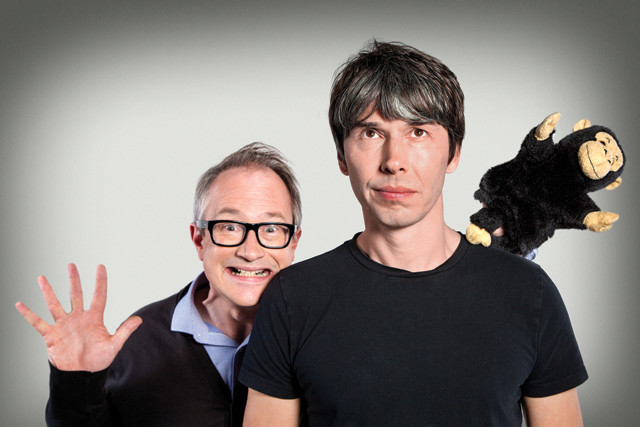
by Kate S. Zalzal Wednesday, March 15, 2017

The "Infinite Monkey Cage," a BBC radio show and podcast hosted by comedian Robin Ince (left) and physicist Brian Cox (right), provides an irreverent and witty take on science. Credit: BBC/Richard Ansett.
“Science is not about finding the right answer, it’s finding the least wrong answers,” quips physician and science writer Ben Goldacre, a guest on “The Infinite Monkey Cage,” a BBC radio show and podcast that casts an irreverent eye on big scientific questions. Goldacre was commenting on the definition of science, but this philosophy — that science is a constantly evolving pursuit, in which all ideas are valid until data and time prove them wrong — is also the refreshing and approachable premise of this witty show.
“Monkey Cage” is hosted by award-winning physicist and science evangelist Brian Cox along with comedian and actor Robin Ince. It began in 2009 and finished its 14th season and first U.S. tour in the summer of 2016 (it is produced in front of a live studio audience). The title — a reference to the aphorism that, given enough time and a typewriter, a monkey will eventually produce the complete works of Shakespeare — lays out the essentially limitless boundaries of the show. The show’s scope of inquiry ranges from pondering what came before the Big Bang to the plausibility of infinite universes, giving the hosts and guests a wide intellectual expanse across which to wander.
With no boundaries, the show goes big on subject matter. Each 30-minute episode revolves around a topic or question. “How do you build a universe?” “What is reality?” “What is the protocol if we detect life outside our planet?” Some episodes focus on the latest science developments as in “Science of Sleep” and “Oceans: The Last Great Frontier.” Some get into more philosophical quandaries, such as “Can Science Save Us?” and “Does Science Need War?”
On each episode, Cox and Ince are joined by two to four guest panelists — from scientists and academics to entertainers, musicians and writers — who come to the scientific question at hand with a range of knowledge, experience and worldviews. Ince’s comedic timing and blunt segues generally keep the conversation lively. Cox, ever the physicist, will indulge Ince and other panelists in their metaphysical wanderings for a bit before bringing the conversation back into sharp scientific focus. The result: smart people chatting about vast subjects and having a good time while doing so.
In reviewing this podcast for EARTH, I listened to episodes from the most recent season as well as to some older ones with titles too tempting to resist. Here are some of my favorite moments:
In “The Universe: What Remains to Be Discovered?” (aired Aug. 1, 2016), the panel explores big questions about our universe. They begin by tallying what we do know and, as the list grows, the impression to the listener is that we have an impressive handle on what’s going on in space. But in his signature move, Cox delivers a deflating ego-check: “Despite all the stuff we do know, all the stuff we’re made of and see around us … it’s only about 5 percent [of what’s out there]. The rest of it is dark matter and dark energy … we might try to understand what that is.”
In “Climate Change” (aired Feb. 15, 2016), climate scientist Gabrielle Walker suggests that scientists begin referring to climate change not in terms of warming or heat — which have pleasurable connotations of hot tubs and beaches — but in terms of energy. Talking of violent storms, melting ice caps, crashing glaciers and flooding coastlines will better impress upon people what’s underway.
Guest panelists Eric Idle, a comedian and musician, and paleobiologist David Martill discuss dinosaurs in “Science Rocks!” (aired Dec. 1, 2013). Idle asks: “If the meteorite that hit off the Yucatán Peninsula had missed, would the dinosaurs still be here?” “Presumably,” Martill says. “And would they have become intelligent?” continues Idle. “Without a doubt,” Martill says. This exchange is “Monkey Cage” at its best: a simple question from a nonexpert leading to a powerful reminder of our serendipitous place in the universe.
Fay Dowker, a cosmologist and guest panelist on the episode “Before the Big Bang” (aired Aug. 4, 2014), sums up the show’s perspective nicely. “I think we can’t now conceive of the things that we will understand in the future. Every discovery in science … has not closed a door … it’s always opened the door to new questions that haven’t even been thought [of] before.”
The studio audience brings spontaneity to the show. One drawback, however, is the ongoing dispute between Cox and Ince over the superiority of physics, which can get a bit tiresome and, at times, makes the show hard to follow. But, overall, “Monkey Cage” hits its target, instilling in listeners a sense of awe for the mysteries of science, and reminding us that, as sentient beings on this planet, we are all capable of exploring, and enjoying, the human endeavor that is science.
© 2008-2021. All rights reserved. Any copying, redistribution or retransmission of any of the contents of this service without the expressed written permission of the American Geosciences Institute is expressly prohibited. Click here for all copyright requests.